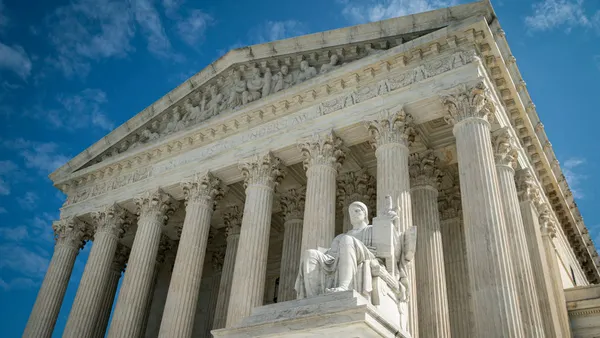Dive Brief:
- Corporate investment banking company BNY Mellon did not violate Title VII of the Civil Rights Act of 1964 when it fired a woman because of social media activity, the 3rd U.S. Circuit Court of Appeals ruled (Bank of New York Mellon Corp., No. 20-2061 (3rd Cir., March 4, 2021)).
- The plaintiff, a senior control analyst, was fired after she posted a comment on a news article on Facebook "about a man who faced criminal charges for driving his car into a crowd of protesters," according to court documents. In response, the worker commented: "Total BS. Too bad he didn't have a bus to plow through." BNY Mellon fired the worker upon discovering her comment, and she sued. The worker claimed race discrimination under Title VII of the Civil Rights Act of 1964. A district court ruled for the employer on summary judgment.
- The 3rd Circuit affirmed the lower court's decision, rejecting the worker's use of comparator evidence to prove her claim. The worker said that the company's decision to retain the two Black employees who also made controversial posts was evidence of discrimination. But neither comparator said anything "as extreme" as the plaintiff in their social media posts, the court said; "Though inappropriate and ill-advised, neither post encouraged mass violence against protesters, as [the plaintiff's] did." The court also rejected the plaintiff's counterargument that the differences between her and the comparators were pointless as BNY Mellon required all employees to follow its social media policy. "This argument might carry some force if the policy prescribed standard punishments, regardless of who a violator is or where she works, but instead it gives decision-makers broad discretion over how to discipline employees," the court responded.
Dive Insight:
The plaintiff in this instance claimed her employer violated Title VII by firing her for social media activity. It's more common, however, for workers to bring social media-related claims under the National Labor Relations Act (NLRA).
When workers use platforms such as Facebook and Twitter, they may engage in protected concerted activity — when "two or more employees take action for their mutual aid or protection regarding terms and conditions of employment," according to the National Labor Relations Board.
The NLRA provides protections for workers who take part in concerted activity, or talk about their employer or work situation, Ogletree Deakins Shareholder Jennifer Betts previously told HR Dive. She said employers should be careful when they are looking at undertaking adverse action tied to activity on social media. If an employee's activity on social media can be perceived as protected concerted activity, the employer could be violating the NLRA if it disciplines the employee for the conduct.
However, the NLRA doesn't cover every instance of social media use. A Texas school fired a teacher who asked former President Donald Trump via Twitter to "remove" undocumented immigrants from her school, on the belief that the message was private, according to The New York Times. The school determined that she had violated the school board's social media policy.









